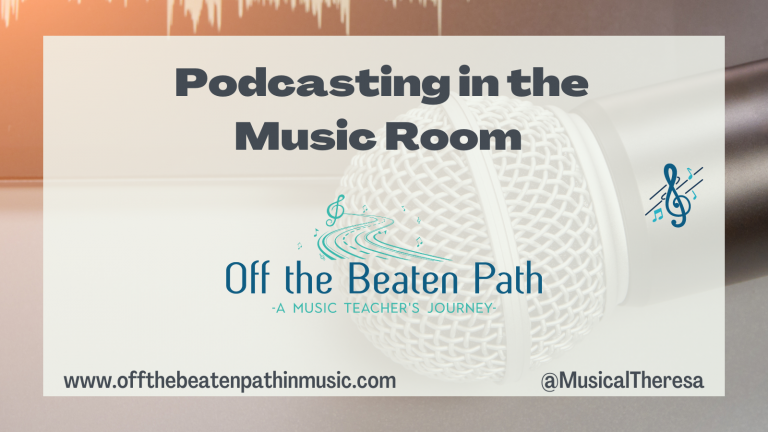Planning With Not For: Involving Students in Concert Preparations
It’s almost that time of year: concert season! For some music teachers, this could be the first live performance in two years. There might be safety measures in place, or maybe there isn’t an audience in-person. For other teachers, this could be an opportunity to try something new, or a return to a much loved tradition. Whatever the case, I encourage you to think about one thing this concert season: how can you plan with the students and not just for the students? How can you give students a voice in concert preparations?
How can you plan with the students and not just for the students? How can you give students a voice in concert preparations?
If this thought is already making you anxious, don’t panic yet. The idea is not to add something to your plate. In fact, with any luck as you give students the opportunity to be involved, some things will come off your plate! Aside from that, by planning with the students, you will make the experience more meaningful for them. When students have a voice in planning, they take more ownership of the process and the performance. And since it’s a student performance, they deserve this!

What are Your Goals?
Begin by having a conversation with the students. Share your goals for the upcoming performance and ask students about theirs. What would make you all consider the performance a success? How will you know you’ve achieved that? This is a good time to tell students about anything you consider a “must have” when planning a performance. What are your non-negotiables? What learning goals do you hope to demonstrate? When you have this conversation with students will determine how much and what kind of input they can provide. Regardless if it’s months before or weeks before, don’t discount its value. Giving the students any amount of voice is better than none!
Involving Students With Repertoire
In some situations, you may get student input about repertoire selection, either having students suggest pieces they would like to play, or having them choose between several options you have provided. Check out this interview by Laura Johnson, where she describes her six-step process for having students select performance repertoire: Incorporating Student-Selected Repertoire in Ensembles. If that’s not an option for you, consider having students choose the performance order. Have students work in groups or as individuals to come up with a performance order, then present it to the class explaining their rationale. The class can vote on which they would like to use.
Introducing Songs
Another easy way to include students in concert preparations is to have them write the song introductions! I can remember many times forgetting about this until the last minute, and then scrambling to put something together that sounded thoughtful and not rushed. If instead you have students write – and read – the introductions, it’s one less thing you have to worry about. When writing song introductions, students can work alone or together, with the process being as simple or complex as you’d like. In fact, here’s a template you can use to give students this opportunity: Concert Song Introductions: Script Template.
Showcasing Other Skills
Besides music, we all have other skills, talents, and hobbies. For students, a performance could be a great way to incorporate these interests! Are there students who enjoy art who could create concert posters or design the program? A student skilled in public speaking might excel serving as the MC for the event. Other students may be interested in designing decorations for the venue or hallway. In your performance planning conversation with the class, ask students if there are other ideas for what could add value to the event.
Consider an Informance
Depending on the age and ability of your students, sometimes a full concert is not appropriate. This may especially be the case for groups who had limited musical instruction during the last 18-months of pandemic teaching. An informance is a great alternative in this situation. An informance is an informational-performance. It’s much more informal than a traditional concert, and typically focuses on the process more than a final product. In an informance, students share what they are working on in class and share what they have learned, while giving the audience information about how the process works along the way.
When I taught beginning band and orchestra, we often had an informance in place of a winter concert. I treated the concert like an open rehearsal. Informances are great to plan with the students, since they can give feedback on what they would like to share, how they want to share it, and what to tell the audience! For more ideas about informances, check out this post by Kathryn Finch about a kindergarten informance: The Kindergarten Music Program, and this post about informances for band and orchestra: The Beginning Instrumental Informance.
Process Over Product
As a runner and someone who has completed several half and full-marathon distance races, we often talk about how the training is more important than the race itself. The training is the hard part: the early mornings, grueling speed workouts, the long runs, and the even longer runs! This is like the preparation we go through as musicians: the practicing, rehearsing, and repetition upon repetition. But that’s where the real growth happens. Without all of that preparation, the performance would never be possible. It’s important that we remember the concert is a big deal and something we should celebrate, but the process leading up to that concert is just as, if not more, important and valuable to the success and growth of our young musicians. Involve the students in this process and give them ownership.
“The process leading up to that concert is just as, if not more, important and valuable to the success and growth of our young musicians.”
One of our goals as music educators should be for the students to feel like they don’t need us anymore. Students should feel like they can be musical and make music not only outside of the classroom, but without us dictating the process either. As we involve students in concert preparations, planning performances and events, think about how you can involve them in the entire music-making process. The result will be better for everyone.
Links for further reading:





